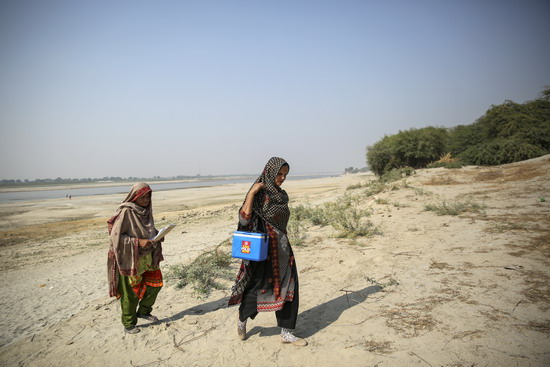 Women go the distance during door-to-door polio vaccination in Hyderabad district, Sindh Province, Pakistan. ©WHO/Asad Zaidi
Women go the distance during door-to-door polio vaccination in Hyderabad district, Sindh Province, Pakistan. ©WHO/Asad Zaidi
Dr Hamid Jafari, Director of the Polio Eradication Programme in the Eastern Mediterranean Region, calls for determination as we tackle the last hurdles to eradication
24 October 2019 – As the new director of the Polio Eradication Programme in the Eastern Mediterranean Region – the last area of this planet where wild poliovirus still paralyses children – it would be easy to feel frustrated. And yet I am not. I am energized.
More than two decades ago, I was involved in laying the foundations of the polio eradication programme across this Region. Today, the Region is polio-free – except for Pakistan and Afghanistan. I have taken the helm of what you could say is the toughest stretch in recent memory. Like many old polio hands, I have a deep sense of unfinished business. After years of dwindling cases, 2019 has seen more than 80 children paralysed by polio, more than two thirds of them in Pakistan.
We often talk about the ‘last mile’ on the road to eradication. Indeed, we have made incredible progress since the Global Polio Eradication Initiative was formed in 1988 with a goal of ridding the earth of a vaccine-preventable disease that then paralysed more than 350,000 children every year. Over the past 30 years we have zeroed in on the virus, to just a handful of districts.
But even one case of polio is too many when the goal is eradication. And the hard truth is that we haven’t reached this goal because our Region is not where it needs to be. With enough determination, I know we can get there. But I want to be honest about some of the hurdles that threaten to block us on this last mile – or worse, send the Region backsliding.
Wild polio persistently circulates in a few core reservoirs in Pakistan and Afghanistan. This year, like many before, those reservoirs have been the source of expanded polio outbreaks.
Part of the challenge is access: we are not reaching every last child. House to house vaccination is the gold standard, but in areas riddled by conflict and insecurity, this isn’t always possible. A recent surge of false social media content against vaccines has added a layer of confusion for families of young children. We’re also aware that communities where polio is entrenched are among the most underserved, and there is growing frustration there as polio vaccination is perceived as the only national health priority.
I have reviewed programme elements with government and partners. We have designed strategies to overcome these challenges and we are respectfully listening to communities. I am in awe of the health staff dedicated to vaccinating children everywhere. What we need now is unified national determination and resolve. Increasing vaccine acceptance and raising population immunity takes political will at every level. We need community leaders, parliamentarians, social, civic and academic institutions to take collective responsibility to ensure communities are listened to, informed and supported.
We also need to strengthen routine vaccination. Recent vaccine-derived polio outbreaks in our Region prove that immunity levels are dangerously low in some areas. That is why the polio programme is working closely with other immunization partners and programmes. Not enough children have completed the national recommended schedule of vaccination that would protect them from polio, measles, diphtheria and other vaccine-preventable diseases. We are determined to change this.
Finally, we need to remember that polio does not respect borders. Earlier this year, polio was detected in Islamic Republic of Iran. Thanks to strong surveillance and robust routine immunization, the virus was contained, but I fear we won’t be as lucky the next time.
To overcome these hurdles, Pakistan and Afghanistan have initiated transformative changes. I’m proud of the bold and enterprising teams in those countries and across the Region working to maintain robust disease surveillance and find innovative ways to integrate vaccination and strengthen other health programmes. This World Polio Day, the Global Commission for the Certification of Poliomyelitis Eradication is anticipated to officially declare wild polio virus type 3 globally eradicated, reaffirming our ability to ultimately rid the world of all polio strains.
To increase the reach of our financial resources, we are working with governments and local authorities to do more with less. The support from our donors is enabling us to find new ways to vaccinate children. But to achieve our goal, we all need to do more.
This piece was first published in The National to mark World Polio Day 2019.


